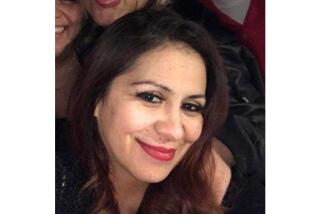Burial of Accused Killer Blocked
- Share via
Citing a law passed by Congress to keep Oklahoma City bomber Timothy J. McVeigh from being buried among his fellow veterans, officials Thursday barred a Riverside National Cemetery burial for a desert man accused of killing one child and chaining up two others.
John Lamont “Rajohn Lord” Davis hanged himself with a jail-cell bedsheet in March while awaiting trial on charges that he had contributed to one son’s death and abused two other sons.
But Davis was also a veteran of the Vietnam War.
Because Davis was honorably discharged, the San Bernardino County coroner’s office was legally compelled to try to secure him a burial site in Riverside National Cemetery.
On Thursday, the cemetery barred Davis’ burial there, said Deputy Director Richard Boyd.
The decision was made based on a law Congress passed in 1997, a week after McVeigh was sentenced to die for the April 1995 bombing that killed 168 people. Veterans groups had been angered that McVeigh, as a Gulf War veteran, was entitled to burial in a national cemetery, so the law denied burial and veterans’ benefits for those found guilty of capital offenses.
“There was a pretty strong outcry because [McVeigh] was a veteran and if he were put to death he could have been buried in a national cemetery,” Boyd said. McVeigh was executed Monday.
Boyd said the law also applies to people accused of capital crimes but not convicted because they escaped or died before trial.
Military officials in Washington approved the decision, he said.
Robert Shaw, San Bernardino County’s lead supervising deputy coroner, said the debate over Davis’ remains--he was cremated after his suicide--has angered veterans in the Inland Empire.
“It has touched a nerve, certainly,” he said. “I do understand the reasoning behind the decision.”
Shaw said the county will store Davis’ remains for a year, in case Davis’ wife, Carrie Lee, comes forward to coordinate and finance a burial herself. After that, Davis, who was declared indigent because relatives could not afford a funeral, will be buried in a local cemetery.
Davis’ family lived in a camouflaged compound in the remote desert outpost of Wonder Valley. Along with his wife and a family friend, who also face charges, he was arrested in October after his two teenage sons reported that they were being held prisoner.
Investigators say the boys had never been to a doctor or a school, were malnourished and underdeveloped, and had been chained to furniture while eating, sleeping and studying the Bible.
Prosecutors later added murder charges after learning a third son had died about 10 years ago. The Davises allegedly burned his body in a trash can. Investigators have not found the body.
More to Read
Sign up for Essential California
The most important California stories and recommendations in your inbox every morning.
You may occasionally receive promotional content from the Los Angeles Times.













